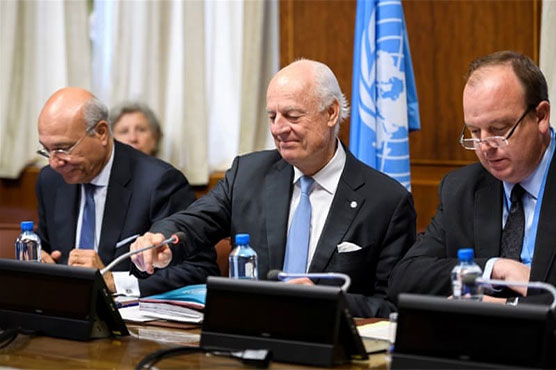Russia holds key to success at Syria talks: experts

Experts argued that it is Syria's key military ally Russia that will play a decisive role in talks.
GENEVA (AFP) - "Syrian owned and Syrian led" is the phrase repeated, arguably ad nauseum, by those supporting the UN-backed committee tasked with amending the war-torn country s constitution.
But experts argued that it is Syria s key military ally Russia that will play a decisive role in whether the talks that were launched this in Geneva week succeed.
"Russia is directing the constitutional process," said Samuel Ramani, a Syria specialist at Oxford University.
"Any breakthrough... would greatly bolster (Moscow s) status," he added.
Multiple rounds of Western-supported peace talks at the UN in Geneva failed to ease Syria s devastating eight-year conflict.
Some have argued that the constitutional committee -- which includes 150 delegates shared equally among the Syrian government, opposition and civil society -- is headed for a similar fate.
President Bashar al-Assad s forces have made gains against the opposition and experts have said that given his improved military position he will quit the talks before agreeing to reforms that threaten his authority.
But Syria specialists cautioned that compromise is possible if Moscow forces Assad s hand.
Russia wants Assad s regime to regain "international legitimacy," so it can access redevelopment funds after years of crippling US and EU sanctions, said Fabrice Balanche, a Syria specialist at the University of Lyon in France.
Balanche added that after intervening on the ground and "saving the regime militarily" Russia is clearly seeking a political solution approved by the UN.
A failure to get that "could be seen as a humiliation for Russia," Balanche said.
The idea to put constitutional reform at the centre of the Syrian peace process was not conceived in Moscow.
It was enshrined in Security Council resolution 2254, which was adopted in December 2015 and defines the UN framework to end the conflict that has killed 370,000 people and displaced millions.
Resolution 2254 also calls for UN-supervised elections in Syria.
But the concept of a consitutional reform committee emerged from diplomacy spearheaded by Russia, outside the UN umbrella, at a 2018 meeting in Sochi.
Assad ally Iran, and opposition backer Turkey also played crucial roles in the meetings at the Black Sea resort.
Experts, and Syrian opposition leaders, said the constitutional committee would not have come to fruition without Russian influence.
"Russia pushed the regime to engage in a political process, which it had previously refused to do," opposition negotiator Yehya al-Aridi told AFP.
The definition of a "breakthrough" at the constitutional talks is not entirely clear.
Opposition negotiators are pushing for an entirely new charter that could help pave the way for a change in government, while Damascus has indicated an openness to amending the existing text.
UN Syria envoy Geir Pedersen, who is mediating the negotiations, underscored that the final document will be an entirely Syrian product.
"Do not expect me or my team to tell you what to write in your constitution," he told the opening ceremony on Wednesday.
"The future constitution belongs to Syrians, to the Syrian people and them alone," Pedersen added.
But according to Balanche, Russian Foreign Minister Sergei Lavrov s visit to Geneva to meet Syrian government and opposition delegates the night before the committee launched sent a clear message.
"The message of Lavrov s visit was very explicit: the Geneva process is controlled by Russia now," Balanche said.

